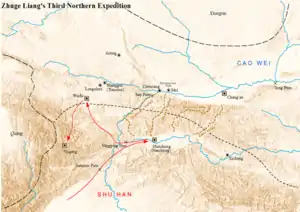Battle of Jianwei
The Battle of Jianwei was fought between the contending states of Shu Han and Cao Wei in the Three Kingdoms period of China. The battle was also the third of a series of military campaigns against Wei launched by Shu's chancellor, Zhuge Liang. The battle concluded with a Shu victory and capture of Wudu and Yinping commanderies, which are around present-day Longnan, Gansu.
| Battle of Jianwei | |||||||||
|---|---|---|---|---|---|---|---|---|---|
| Part of the third of Zhuge Liang's Northern Expeditions | |||||||||
 The third of Zhuge Liang's northern expeditions | |||||||||
| |||||||||
| Belligerents | |||||||||
| Cao Wei | Shu Han | ||||||||
| Commanders and leaders | |||||||||
| Guo Huai |
Zhuge Liang Chen Shi | ||||||||
| Battle of Jianwei | |||||||
|---|---|---|---|---|---|---|---|
| Traditional Chinese | 建威之戰 | ||||||
| Simplified Chinese | 建威之战 | ||||||
| |||||||
The battle
In the spring of 229, Zhuge Liang ordered Chen Shi to lead troops to attack the Wei-controlled Wudu (武都; around present-day Cheng County, Gansu) and Yinping (陰平; present-day Wen County, Gansu) commanderies,[2][3] while he remained at the staging area in Yangping Pass with an army as backup.
Upon receiving news that the Wei general Guo Huai had mobilised his forces to attack Chen Shi, Zhuge Liang moved his army from Yangping Pass to Jianwei (建威; in present-day Longnan, Gansu) in the northwestern corner of Wudu Commandery.[4][5] When Guo Huai heard that Zhuge Liang was heading towards Jianwei, he decided not to attack Chen Shi, and instead ordered his troops to evacuate the area and set up a defensive line in anticipation of further Shu advances. However, Zhuge Liang did not proceed farther after reaching Jianwei, where he deployed his troops to counter any Wei reinforcements that might show up.
Guo Huai and his troops retreated later. The Shu forces thus successfully captured Wudu and Yinping commanderies.[6][5] As the Wei government deemed the two commanderies unimportant, they did not send forces to recapture them from Shu.
Since Wei forces had relocated the local tribesmen and livestock away from the two commanderies, Zhuge Liang thought that it would be futile and strategically useless to station troops there to guard them. As a result, he withdrew all Shu forces from the two commanderies and retreated to Hanzhong Commandery.
Aftermath
The victory at Jianwei was short-lived, and the manpower and resources invested in it drained the third Northern Expedition too greatly; for the rest of 229 and for the first part of 230, the Shu forces could do nothing more than construct a defensive line in Hanzhong Commandery in preparation for a Wei offensive towards Hanzhong in the autumn. The diminished Shu forces would launch no further offensives until the fourth expedition in 231.
When Zhuge Liang returned from the campaign, the Shu emperor Liu Shan issued an imperial decree to congratulate him on his successes in defeating Wang Shuang during the second Northern Expedition and capturing Wudu and Yinping commanderies during the third Northern Expedition. He also restored Zhuge Liang to the position of Imperial Chancellor (丞相).[7]
References
- Zizhi Tongjian vol. 71.
- ([建興]七年,亮遣陳戒攻武都、陰平。) Sanguozhi vol. 35.
- Sima (1084), vol. 71.
- (魏雍州刺史郭淮率衆欲擊戒,亮自出至建威, ...) Sanguozhi vol. 35.
- [[#CITEREF|]].
- (... 淮退還,遂平二郡。) Sanguozhi vol. 35.
- (詔策亮曰:「街亭之役,咎由馬謖,而君引愆,深自貶抑,重違君意,聽順所守。前年耀師,馘斬王雙;今歲爰征,郭淮遁走;降集氐、羌,興復二郡,威鎮凶暴,功勳顯然。方今天下騷擾,元惡未梟,君受大任,幹國之重,而乆自挹損,非所以光揚洪烈矣。今復君丞相,君其勿辭。」) Sanguozhi vol. 35.
- Chen, Shou (3rd century). Records of the Three Kingdoms (Sanguozhi).
- de Crespigny, Rafe (2003). The Three Kingdoms and Western Jin; a history of China in the Third Century AD. https://digitalcollections.anu.edu.au/html/1885/42048/3KWJin.html
- Pei, Songzhi (5th century). Annotations to Records of the Three Kingdoms (Sanguozhi zhu).
- Sima, Guang (1084). Zizhi Tongjian.